B&C's 80 at 80 Part Two
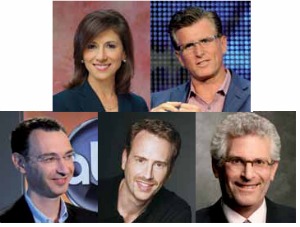
The smarter way to stay on top of broadcasting and cable industry. Sign up below
You are now subscribed
Your newsletter sign-up was successful
Click here for more on B&C's 80th AnniversaryClick here to read Part One of B&C's 80 at 80
As we celebrate our 80th anniversary for three straight issues (this is week two), we decided to pull up and take a look at the people, shows, jobs, companies and more that are truly dictating where the television business is headed. The editorial staff at B&C created this list very simply based on the names we think are the most influential right now in the industry. Don't see your name this week? Make sure you didn't miss last week's issue, which had part one of this two-part list.
THE BIG GIGS
The Network Entertainment Chiefs
It's the job everyone wants, programming the broadcast networks, and it takes the right kind of creativity, business acumen, personality and-especially-thick skin, as most of what you are going to try will fail. CBS' talented Nina Tassler has kept CBS fighting for network supremacy longer than any other in her role. Fox's Kevin Reilly pulled the rare feat of moving from one network (NBC) to another in the same job and is enjoying life at the top. At ABC, savvy cable veteran Paul Lee learned quickly to drink from the firehose and has found some early wins. At NBC, Bob Greenblatt has his work cut out for him, but few are betting against him coming off a great run at Showtime. And at The CW, the well-liked Mark Pedowitz is channeling his inner teenage girl to pump new life into the network.

The Media Buyers
Television shows are, at a basic level, just there to get you to watch the ads, so make no mistake about it: Madison Avenue still pulls the strings in the business. And that means the people who buy the ads are the real power players in the TV industry, not just when they drop $8-$9 billion at upfront time, but all around the calendar year. So it pays to be nice to people like GroupM's Rino Scanzoni, MediaVest's Donna Speciale, Starcom's Mike Rosen, OMD's Chris Geraci, Zenith's Ava Jordhamo, Initiative's Kris Magel and Carat's Andy Donchin.
The Sports Chiefs
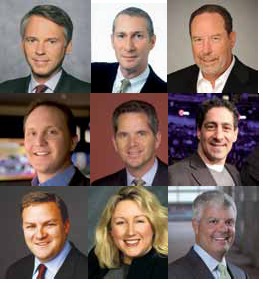
OK, we lied. This is the job everyone really wants, deep down. Yes, they get tickets to everything and get to hang around sports all day. Not terrible. So if you ever hear a complaint coming from people like CBS' Sean McManus; ESPN's John Skipper; Fox's Ed Goren, Eric Shanks or Randy Freer; HBO's Ken Hershman; NBC's Mark Lazarus; Time Warner Cable's Melinda Wittmer (yes, keep an eye on what she's concocting with David Rone); or Turner's David Levy, you have the right to tell them to pipe down and enjoy a gig we'd all love to have. Except when one of their talent ends up on TMZ.
The Syndicators
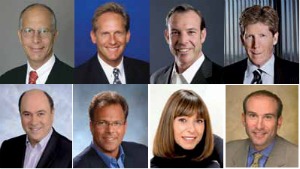
The syndication marketplace has heated up again, from a massive influx of new talk shows to the success stories of off-network sales for new primetime hits. And the people to watch that make the big plays in this world include Warner Bros.' Ken Werner, CBS Television Distribution's John Nogawski, Sony's John Weiser, Twentieth Television's Greg Meidel, Debmar-Mercury's Mort Marcus and Ira Bernstein, ABC's Janice Marinelle and NBC's Barry Wallach.
The smarter way to stay on top of broadcasting and cable industry. Sign up below
The News Chiefs
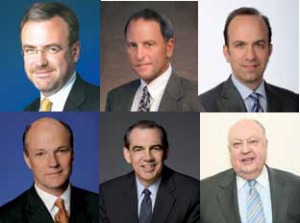
The news wars are as vitriolic as they come, with the battle for eyeballs from morning until night constantly making for high-profile rivalries, talent poaching and great headlines. On the broadcast side, NBC's Steve Capus has strong staples like Today and the backing of a cable news net to keep his division flying. CBS' Jeff Fager has his beloved 60 Minutes as strong as ever and Scott Pelley in place, and will look to make his real mark when he blows up the morning show at some point. ABC's Ben Sherwood is the new kid on the scene but has a strong stable of stars, and all eyes are on him to see if a tweak at Good Morning America is in the works to finally catch NBC. But the real fun tends to happen on the cable side, where Phil Griffin's MSNBC and Ken Jautz's CNN are trying to catch up to the ratings of Roger Ailes' Fox News Channel, and there obviously is no love lost in that battle.
POTUS
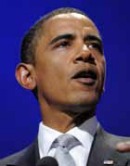
President Barack Obama has become something of a broadband Cheerleader in Chief, allocating billions in broadband stimulus money and making advanced wireless deployment one of the national priorities in his State of the Union speech. With government services, remote diagnosis, education and energy reforms all depending on broadband deployment, the White House needs to get broadband connected universally to prevent that push from becoming a digital divide and regressive tax. That has also driven Obama's support for spectrum auctions, which could remake the broadcasting business.
The Commissioners
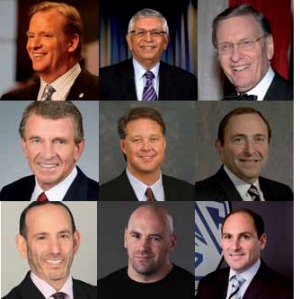
Sports properties are the hottest thing in television right now, so it is up to the purveyors of each league to keep them primed to pull in the skyrocketing rights fees. Roger Goodell was listed in last week's issue because everything else is a distant second to the NFL. But TV outlets keep lining up to pay big bucks for properties like David Stern's NBA, Bud Selig's Major League Baseball, Tim Finchem's PGA and Brian France's NASCAR. Even Gary Bettman's National Hockey League and Don Garber's Major League Soccer are cashing bigger checks now. And don't forget about the man who took a sport nobody wanted to the one everybody wants, UFC president Dana White. We'd talk about the NCAA conference commissioners, but we'll wait until that all finally gets figured out, though the Pac-12's Larry Scott has made the most headlines of late.
SCOTUS

The Supreme Court is in a position to reverse the FCC's creeping regulation of fleeting expletives and cursing in a world where, like it or not, most of the competition is free to attract audiences with a far broader array of content choices. The National Association of Broadcasters isn't asking to be free of indecency regulations, but the High Court could go further, ruling on the overall constitutionality of the FCC's content-regulation regime. In either case, the decision in the FCC vs. Fox/ABC indecency appeals will affect what millions can and can't see on TV.
Wall Street Analysts

The days of media company chiefs shooting from the hip are long gone, and a big reason for that is, with most of them public, there is a new level of responsibility and accountability (sadly for journalists). But the need to appeal to Wall Street is about far more than the eradication of public feuding; it means that businesses are now very much structured around quarterly reports-and trying to make Wall Street understand what you are doing and why. It's a long way from Manhattan to Hollywood, and the same language isn't necessarily spoken in both places, so the relationship is one that needs much attention.
FCC Chairman
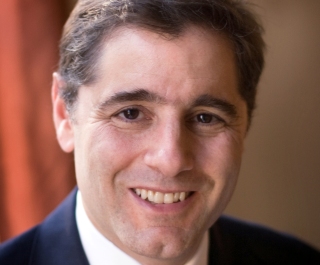
Whether you view him as Ahab to the white whale of broadcast spectrum or Moses leading the media to the promised land of broadband delivery, Julius Genachowski has become the poster regulator for the rise of the Internet as the vehicle for a seismic change in how the nation, and the world, communicates. As FCC chairman, he sets the agenda at an agency that regulates broadcast, cable, satellite and the Internet, and in the case of broadcasters, his Democratic majority could determine the fate of the medium through their rules for reclaiming broadcast spectrum via auctions.
The Agents
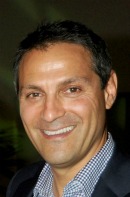
Ari Gold of Entourage may be gone (for now), but the inspiration for his character -- Ari Emanuel of William Morris Endeavor-remains as strong as ever, as does the impact that television's behind-the-scenes dealmakers have on packaging shows, guiding talent and all the other quiet (or sometimes loud) dealings you don't hear about until you read them in the trades. Whether it's his coworkers at WME, or the superagents at places like CAA, ICM, UTA, Octagon and elsewhere, if you don't have a good agent, you're still nowhere, baby.
NCTA President
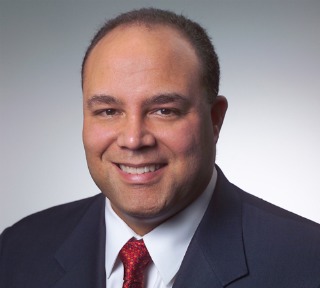
Former FCC chairman Michael Powell has kept a fairly low profile since taking over from Kyle McSlarrow atop the National Cable & Telecommunications Association. But Powell has a high-profile challenge navigating among the sometimes competing interests of an association that includes programmers with cable and broadcast holdings; cable operators with programming, telephone and broadband interests; and large and small operators with different agendas. The cable industry has positioned itself as the major player in wired broadband delivery, but Powell will need to help protect and grow its business in a world going increasingly wireless.
CEA President

Don't like everything they do, but can't live without ‘em. That pretty much sums up the TV industry's attitude toward the Consumer Electronics Association and its president, Gary Shaprio. Having spent $810,000 in the first two quartersof 2011 lobbying the federal government, the CEA has been a powerful opponent on broadcast-spectrum issues, where Shapiro has backed proposals to auction off a large chunk of broadcast spectrum for wireless broadband applications. But the CEA and its members are also indispensable tech and business allies in the future of TV, as operators, networks and stations look to deliver more programming to new CE devices.
NAB President
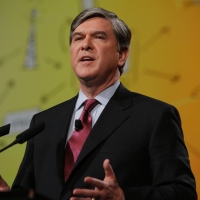
How effective the president of the National Association of Broadcasters is in influencing the shape of spectrum incentive auction legislation almost certain to become law will also almost certainly become Gordon Smith's legacy at NAB. The softspoken former senator from Oregon who made his business fortune in frozen foods has to make sure the FCC does not put broadcasting in the deep freeze on its way to growing wireless broadband.
THE FRANCHISES
'60 Minutes'

As broadcast newsmagazines went out of fashion in recent years, the genre's flagship show only got stronger as the calling card for a CBS News division that has work to do in other dayparts. Remaining relevant by smartly keeping the list of contributors fresh and juggling the right mix of journalism, 60 Minutes is the antithesis of reality TV in that it shows that sometimes it's OK to just be smarter than the room.
'American Idol'

In one of the most unheard-of developments in recent years, a complete reboot of American Idol saw the departure of Simon Cowell yet the show somehow remained a ratings Death Star for Fox. With Ryan, J-Lo, Steven and Randy all set to return in January, you can keep saying 2012 is the year when the show will finally fall off a cliff. And you will probably be wrong yet again.
'The Today Show'
No Katie, no problem. No Meredith, no problem. A true testament to the powerful franchise it has built (or maybe just to Matt and Al...), NBC's morning gold standard has shrugged off some major personnel moves in recent years to just keep winning. With executive producer Jim Bell at the helm, it continues to stiff-arm Good Morning America and leave CBS' revolving door of a show in the dust with a combination of a rock-solid first half hour and the right mix from there. And of course, there's Hoda and Kathie Lee....
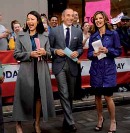
The Olympics
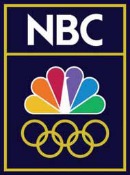
They only come around once every two years, only last about two weeks, are often at off-hours and largely include sports you never hear about again for another 3 years and 50 weeks. Yet, some of the industry's biggest players schlepped to Switzerland this year to try and pay huge cash for the rights to show them. In the end, incumbent NBC took the gold, and now will have to find a way to actually make money off of events like shuffleboard on ice and shooting targets while on skis.
'Jersey Shore'

We are bathing in self-hatred as we write this, but the MTV show has transcended pop culture like no one could believe and serves as the perfect reminder that no matter what any of us ever says-from journalists to network executives-no one has any clue whatsoever what in television is going to pop and why. Why is this show on the list? Because we defy you to find us one person in this country (and heaven forbid, Italy) that doesn't know what a Snooki is.
'The Daily Show'
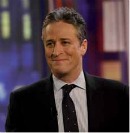
Rarely can anything live up to its reputation, but turn on Comedy Central weeknights at 11 and you will still see some of the best writing and delivery in television. While it scares us a bit to think how many people get their only news from this show, the comedy is virtually unmatched in both smarts and sheer hilarity. And with this election cycle looking the way it is, we can't wait to watch what the next year will bring.
COMPANIES, COMMUNITIES & CASH
Apple
Regime change can mean a lot of things, so Steve Jobs' departure and subsequent sad passing is one of the most-watched changes in corporate America. But from the iPhone to the iPad, Apple has revolutionized the content delivery business and remains one of the biggest players in the industry, no matter who is at the helm. Whether the company starts making TVs, as expected, or creating original programming, or just keeps cranking out devices that capture buzz and customers alike, the industry watches its every move, and rightfully so.
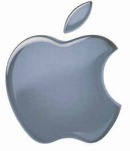
Detroit
Yes, the Lions and Tigers have led a sports renaissance in the Motor City, but it is the rebound in the auto industry that has been a welcome trend for the television business. When the auto industry suffers, ad dollars dry up for stations and networks alike, and that is a crash no one can afford.

Best Buy
The retailer has its work cut out for it to thrive, but walking into a Best Buy is still one of the best ways to see what is selling in the electronics and content-delivery business. Best example: A year ago, 3DTV displays were everywhere on the floor. Now walk in, and 3D is an afterthought when the salespeople describe a new set to you. Brick-and-mortar electronics businesses aren't getting any easier, but they are still a crucial part of the industry-and a great market research tool-and CEO Brian Dunn is fighting the good fight.

The So-Called Disruptors
If you can't beat ‘em, join ‘em comes to mind, as the television industry has rushed to get into bed with the same companies that could be viewed as taking people away from its main source of income: the original airing on television. But companies like Twitter, Facebook, Netflix and Amazon are no longer disruptors; they are absolutely part of the television business. Are they friends or foes? It doesn't matter, because they-or at least companies like them-are here to stay.
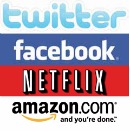
Retrans Cash
Leslie Moonves was right all along. The CBS chief, long the vocal torch-bearer for the demands of actual cash from those who carry his signal, the broadcast industry is now seeing that much-needed second revenue stream that can put a couple of non-cyclical bucks in its pocket. It's not necessarily a game-changer, as the broadcast business still needs to reinvent on the fly, but it has given broadcasters a lot more financial muscle.

Google
Google's efforts to expand its online empire into the $72 billion TV ad business have so far inspired more fear than concrete results. Still, Google's YouTube operation is by far the most popular site for video; its Android mobile platform is in more than 43% of all smartphones in the U.S.; and its recent $12.5 billion acquisition of mobile phone and set-top box maker Motorola Mobility gives it a window into millions of multichannel homes. With a market cap of $175 billion to back its ambitions, Google will continue to inspire competitive angst.

World Wrestling Entertainment
Led by modern-day P.T. Barnum Vince McMahon, the WWE somehow just keeps reinventing itself enough to remain an absolute cable and pay-per-view powerhouse. This is not just a bunch of people pretending to fight -- the WWE's "sports entertainment" is about character development and storytelling -- and more sports and TV outlets could benefit from taking a lesson on how the WWE does week in and week out.

Nielsen
We know, you think Nielsen stinks. But this just in: No one does what they do better-and it is still the major currency in the billion-dollar television industry, a trend that shows absolutely zero sign of changing anytime soon. If you don't like it, go invent something better. Oh, that's right, no one can -- or wants to spend the real money to try.
MORE THAN A PRETTY FACE

Simon Cowell
Sure, The X Factor didn't hit the (probably unrealistic) expectations many had for it when it launched, but the fact that it had those expectations in the first place is exactly why Cowell is one of the biggest players in television, on two continents. His sway allowed him to jump from Idol to his new show on Fox, and his popularity across the pond is unwavering. And to wear those T-shirts and just not give a toss -- well, that just wreaks of success.

Tina Fey
Still one of the drivers of pop culture, the 30 Rock star and creator has Hollywood at her fingertips. While Fey keeps her NBC show humming along, her work on the big screen still drives people to theaters. And her parody of Sarah Palin on Saturday Night Live is absolutely part of the reason the former Alaska governor still has a through-the-roof Q score today, politics aside.
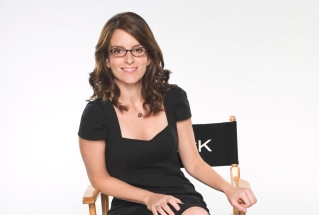
Jay Leno
He has weathered quite a few storms throughout his Tonight Show run, but the ratings still say he is the real King of Late Night. Like him or not, Leno plays in the flyover states where broadcast hits are made, and he has stuck to his knitting the entire time -- he just wants to tell jokes at 11:35 p.m. And while NBC probably thinks it has a perfect successor in Jimmy Fallon, it will have to wait. Fallon will move to the Tonight Show exactly one day after Leno's funeral, because that's when everyone expects Jay to give up that once-vaunted seat the next time.
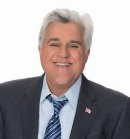
Ryan Seacrest
We would list all of Seacrest's jobs here, but that would take up pretty much the whole section. Plus, who can keep track of them all? From on-air host (TV and radio) to all of his behind-the-scenes work, Seacrest has built himself into a television institution. And whether he decides to stay in the Comcast-NBCU family or jump to a rival like Disney, it will be a long time before Seacrest will be (to borrow an old and missed American Idol phrase)...out.

Oprah Winfrey
Her show may be gone, but its legacy lives on -- from its successful offshoots like Dr. Phil and Dr. Oz to the fact everyone and their mother is trying to launch a talk show to snag some of the eyeballs that were left behind. And while Winfrey turns her attention to her fledgling cable network that badly needs some of her TLC, networks and syndicators alike would line up to put her on the air in virtually any format if she ever decided to walk back down that road.
THE HITMAKERS
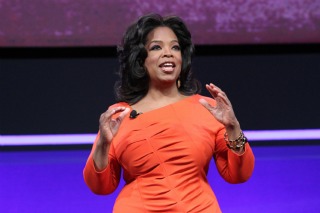
J.J. Abrams
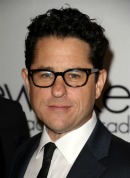
The '80s had Steven Bochco, the '90s were all about David E. Kelley. And so far, the 2000s have been all about young creatives like Abrams. Abrams first made his mark in 1998 with The WB's Felicity, starring Keri Russell. Since then, he's gone on to inspire, amaze and occasionally confuse us with complex, mythologyheavy series such as Alias, Lost and Fringe. Abrams' form of TV-making isn't for those who don't want to pay rapt attention, but Abrams' methods have forever changed the medium.
Mark Burnett
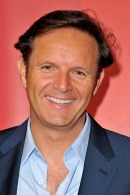
When you think of reality producers, you still think of Burnett, who to this day continues a virtually unrivaled run on top of the unscripted game. He has evolved long-running franchises like Survivor and The Apprentice to live well past a typical show's sell-by date, but still hustles to find the franchises -- on broadcast or cable or even online -- that will replace them when they are finally voted off the island, fired or whatever way he comes up with next to send someone back to reality.
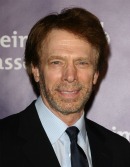
Jerry Bruckheimer
CBS is what it is today largely because of Bruckheimer. The über-producer is behind the entire CSI franchise, as well as the network's long-running and multiple Emmy-winning The Amazing Race. Entire cable networks have been built on the backs of CSI repeats, as have many TV stations' weekend schedules. Along the way, Bruckheimer also has produced such solid dramas as Without a Trace and Cold Case, while bringing Disney's billion-dollar Pirates of the Caribbean blockbusters and other major films to the big screen.
Peter Chernin
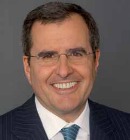
Since he left News Corp., Rupert Murdoch's former right-hand man has become part producer, part mini-mogul and part kingmaker and has the entire entertainment industry waiting to see what he does next. In the meantime, his Chernin Entertainment production company has gotten some new shows to stick on the air, like Fox's New Girl and the long-hyped Terra Nova. But many feel that before long Chernin will have a bigger trick up his sleeve, whether through acquisition, partnership or maybe even just going back to work for someone else.
The Funny Guys
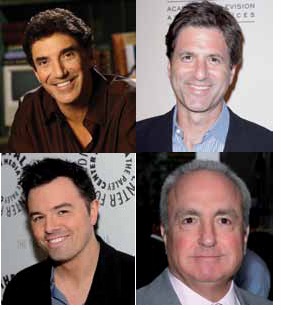
Comedy doesn't just come back cyclically. It needs funny people to make people laugh, and there are a few who seem to have mastered that right now. Chuck Lorre improbably shook off the Charlie Sheen mess to keep Two and a Half Men hot, while continuing to develop new hits. At the same time, Steve Levitan became the Emmy darling with Modern Family, a show that reminded everyone you don't need some big trick; funny and charming still works just fine. And mainstays like Seth MacFarlane and Lorne Michaels just keep cranking out hit television year after year.
Larry David
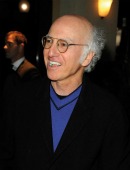
One of the keys to the unrivaled success of Seinfeld, he pulled the rare feat of finding a second act with HBO's Curb Your Enthusiasm, which this season produced an episode, "Palestinian Chicken," that industry insiders across the spectrum were calling one of the best episodes of a comedy in recent memory. And while David's two shows aren't that much different, you get the sense that as long as he wants to write --or act -- networks will be lining up to give him a stage.
